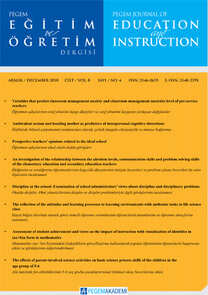Divergent Patterns of Variant Tag Questions in Pakistani English: A Corpus-based Comparative Study
___
Abbas, S. (1993). The power of English in Pakistan. World Englishes, 12(2), 147–156. https://doi.org/10.1111/j.1467-971X.1993. tb00017.xAlgeo, J. (1990). It’sa myth, innit? Politeness and the English tag question. The State of the Language, 443-450.
Anthony, L. (2020). AntConc (Version 3.5.9). Waseda University. https://www.laurenceanthony.net/software
Asghar, S., Mahmood, M., & Asghar, Z. (2018). A multidimensional analysis of Pakistani legal English. International Journal of English Linguistics, 8(5), 215. https://doi.org/10.5539/ijel. v8n5p215
Axelsson, K. (2011). Tag questions in fiction dialogue. (Ph.D. thesis). University of Gothenburg
Baratta, A. (2019). World Englishes in English language teaching. In World Englishes in English Language Teaching. https://doi. org/10.1007/978-3-030-13286-6
Benhima, M., Tilwani, S. A., & Asif, M. (2021). English language learners’ use of translation and attitudes towards learning vocabulary. TESOL International Journal, 16(4.3), 157–175.
Cheng, W., & Warren, W. (2000). She knows more about Hong Kong than you do isn’t it: Tags in Hong Kong conversational English. Journal of Pragmatics, 33, 1419–1439.
Greenbaum, S., & Nelson, G. (1996). The international corpus of English (ICE) project. World Englishes, 15(1), 3–15. https://doi. org/10.1111/j.1467-971X.1996.tb00088.x
Hickey, R. (2005). Legacies of colonial English: Studies in transported dialects. In Legacies of Colonial English: Studies in Transported Dialects. https://doi.org/10.1017/CBO9780511486920
Hughes, A., Trudgill, P., & Watt, D. (2012). English accents & dialects (Fifth). Routledge.
Hussain, Z., & Mahmood, M. A. (2014). Invariant tag questions in Pakistani English: a comparison with native and other non- native Englishes. Asian Englishes, 16(3), 229–238. https://doi. org/10.1080/13488678.2014.951465
Li, E. S. H., & Mahboob, A. (2013). English today: Forms, functions, and uses. Pearson Education Asia Limited.
Khan, I., & Humaira. (2012). The evolution of Pakistani English (PakE) as a legitimate variety of English. International Journal of Applied Linguistics and English Literature, 1(5), 90–99. https:// doi.org/10.7575/ijalel.v.1n.5p.90
Kirkpatrick, A. (2021). The routledge handbook of world Englishes (Second). Routledge. https://doi.org/10.1515/angl.2011.011
Kochi, D. L. (2006). A task-based approach to teaching a content- based Canadian studies course in an EFL context. Asian EFL Journal, 8(3), 122–139.
Mahboob, A. (2002). “No English, No Future” language policy in Pakistan. In Political independence with linguistic servitude: The politics about languages in the developing world (pp. 15–39).
Mahboob, A. (2003). The English language in Pakistan: A brief overview of its history and linguistics. Pakistan Journal of Language, 4(1), 1–28.
Mahboob, A. (2009). English as an Islamic language: A case study of Pakistani English. World Englishes, 28(2), 175–189. https:// doi.org/10.1111/j.1467-971X.2009.01583.x
McArthur, T. (2002). The Oxford guide to world English. McGregor, W. 1997. Semiotic grammar. Oxford: Clarendon
McEnery, T., Xiao, R., & Tono, Y. (2006). Corpus-based language studies: An advanced resource book. Taylor & Francis.
Mollin, S. (2006). Euro-English: Assessing variety status. Germany: Ilmprint langewiesen
Nelson, C. L., Proshina, Z. G., & Davis, D. R. (2020). The hHandbook of world Englishes (Second). Wiley-Blackwell.
Parks, G. et al. (1989). 101 Myths about the English Language. Southampton: Englang Books.
Rahman, T. (2001). English-teaching institutions in Pakistan. Journal of Multilingual and Multicultural Development, 22(3), 242–261. https://doi.org/10.1080/01434630108666435
Rahman, T. (2010). Language problems and politics in Pakistan. In Routledge Handbook of South Asian Politics (pp. 248-262). Routledge.
Rahman, T. (2020). Pakistani English. In and A. K. Kingsley Bolton, Werner Botha (Ed.), The Handbook of Asian Englishes (pp. 279–296). John Wiley & Sons, Inc.
Rasool, G., & Winke, P. (2019). Undergraduate students’ motivation to learn and attitudes towards English in multilingual Pakistan: A look at shifts in English as a world language. System, 82, 50–62. https://doi.org/10.1016/j.system.2019.02.015
Shamim, F. (2008). Trends, issues and challenges in English language education in Pakistan. Asia Pacific Journal of Education, 28(3), 235–249. https://doi.org/10.1080/021887908 02267324
Stubbe, M., & Holmes, J. (1995). You k now, eh and other ‘exasperating expressions’: An analysis of social and stylistic variation in the use of pragmatic devices in a sample of New Zealand English. Language & Communication, 15(1), 63-88.
Tottie, G., & Hoffmann, S. (2006). Tag questions in British and American English. Journal of English Linguistics, 34(4), 283-311.
Umrani, T., & Bughio, F. A. (2015). Language politics and role of English in Pakistan. In ARIEL- An International Journal of Research in English Language and Literature (Vol. 26)
- ISSN: 2146-0655
- Yayın Aralığı: 4
- Başlangıç: 2011
- Yayıncı: Pegem Akademi Yayıncılık Eğitim Danışmanlık Hizmetleri Tic. Ltd. Şti.
A Systematic Review on Pupils’ Misconceptions and Errors in Trigonometry
Nurjailam Hamzah, Siti Mistima Maat, Zanaton Ikhsan
Bambang Budi Wiyono, Asroful Kadafi, Muslihati, M. Ramli
Examination of Gifted Students’ Internet / Game Addiction and School Social Behaviors
Ayşin Kaplan SAYI, Filiz ŞAHİN
School Physical Education courses: A study on challenges and on restoring their functions
Ömer Cengiz, Yunus Emre Avcı, Mustafa Toprak
Development of an instrument of assertive communication scale based on Yogyakarta Cultural Value
Andi Mappiare, M.Ramli, Ahmad Taufiq, Nur Hidayah, Sunaryono, Muya Barida
Sarintan N. KAHARU, Jusman MANSYUR
Tribhuwan Kumar, Venkanna Nukapangu, Ahdi Hassan
Development and implementation of mathematics attitudes scale for the primary and secondary students
